In order to strengthen Pilgrims of Ibillin’s outreach while continuing our primary support relationship with the Mar Elias Educational Institutions, the Board of Directors nurtures partner relationships with other peace-building programs in Israel/Palestine.
Since 2008, annual grants of have been given to Peace-building Partner organizations beyond the Mar Elias Schools in Ibillin. In 2020 we gave larger grants because of increased needs due to COVID-19.
The following priorities guide our annual choice of Partners:
For 2020, our Peace-building Partners support totaled $79,712 and included:
To support any of those programs with a secure online gift, click here. Be sure to designate which programs your gift supports.
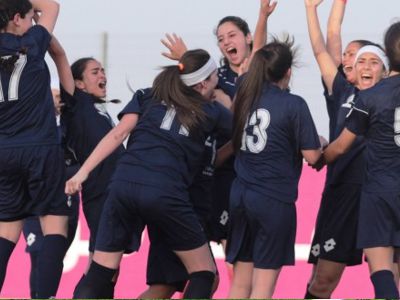
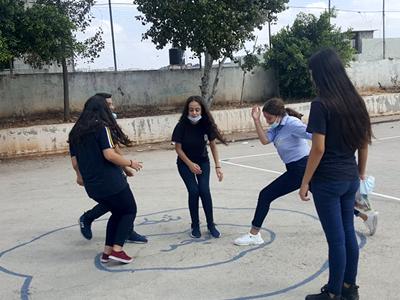
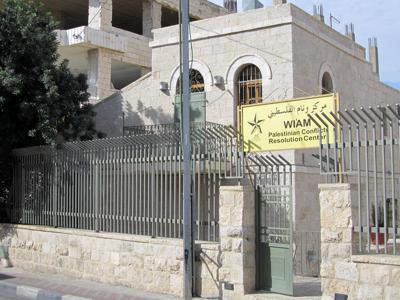 “We have found that conflict resolution is the art of working and sharing ourselves, our resources, our minds, and hearts with others.” — Zoughbi Zoughbi, Wi’am founder and director
“We have found that conflict resolution is the art of working and sharing ourselves, our resources, our minds, and hearts with others.” — Zoughbi Zoughbi, Wi’am founder and director
Wi’am is a grass-roots organization, founded in Bethlehem in 1994. Since its inception, Wi’am has been a place for conflict transformation, restorative justice and mediation. This mediation focuses on the Arab traditions of reconciliation, called Sulha, coupled with different schools of thought from around the world.
Wi’am is also a community center for peace building, sustainable development, empowerment and hope. Both regionally and on an international level, Wi’am attempts to create and strengthen a culture of acceptance and understanding. Wi’am tries to be a center of hope to a people living under occupation and a world that is brimming with the cries of injustice and oppression.
“We are like an olive tree, with its roots deeply rooted in the ground with branches that reach out to the world. Our words produce more than sound; they walk tall to the four corners of the earth. For some, the day to day activities are only part of the job, but the larger picture shows a commitment to serve and enrich community relationships and to be an integral part of fostering positive changes for our future.” — Zoughbi Zoughbi
Pilgrims of Ibillin works with Wi’am to plan our “Living Stones” pilgrimages, with Wi’am staff handling all Holy Land accommodations and scheduling for us. Located in the shadow of the Separation Wall that surrounds Bethlehem, Wi’am stands as a symbol of hope for children, youth, women, and families living in the Occupied Palestinian Territory.
For more information, visit Wi’am’s website and Facebook page.
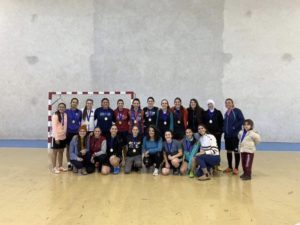
Pilgrims of Ibillin annual program grant supports the girls’ soccer program by paying fees for trainers who work with the program’s coaches every summer. Such support contributes to the core of Diyar’s mission of empowering Palestinian young women leadership.
The majority of trainers are the older members of the Diyar Women Soccer Team whom we also supported back when the women’s team was created. As such, these funds allow Diyar to create economic opportunities, aside from the much needed space and forum, for these women to excel and engage in what they love to do the most, which is to play sports.
Not only this, but having the program grant help from Pilgrims allowed us to really concentrate on other fields of sports for girls and women. As such, we see a growth in volleyball as now new teams started in that direction and a dramatic growth in Karate/self-defense as well with many young girls enrolling.
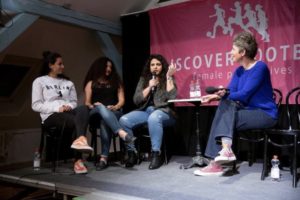
Pilgrims’ supportwill truly make a difference for the women trainers in soccer. These women, who are both Christians and Muslims, actually come from different localities within Bethlehem: some come from the actual city of Bethlehem and nearby Beit Jala, but almost half come from the villages surrounding Bethlehem. That in itself is remarkable because the women from the rural areas (with some being head veiled) are defying the traditional roles and images of Palestinian women. Being a trainer in the sports school is very important to these young women because this is their only economic opportunity. Having a monthly salary helps them as employment is extremely low in the Palestinian society among women and youth (actually the highest unemployment rates are among women and youth).
In 2020 our ministry with the young girls in sports, has been deeply impacted due to the COVID-19 pandemic, especially as Bethlehem faced heavy lockdowns for many months during this year starting in March, and again applied in late June. So, it was impossible to really do much in terms of training while all events and public gatherings have been cancelled so far.
However, we had major moments that we would like to share with you and highlight here below:
And perhaps the good news in all of this is that despite the very difficult situation that makes it challenging for many young girls and women to join the teams at this moment, as many have not be able to, we still have 53 young girls and women players going strong and being committed. Actually, the majority indicated that their commitment and strength is because they continue to be active in our sports programs. Therefore, one of our main tasks for 2021 is to increase again the number of youngsters playing soccer so as to have a strong base to build on for our First team. The players are divided on the following teams:
~Thanks to Rana Khoury, Diyar, for the content of this report.
Donate to Support Diyar Girls’ Soccer
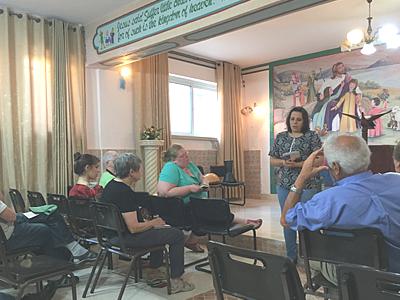
Hope School is a Christian charity school for orphans and needy children that is located near Bethlehem – the birthplace of our Lord Jesus Christ. The school provides education for both boys and girls ages 11 to 18 years old; the school provides for the spiritual, academic and physical growth of every child we serve.
Pilgrims of Ibillin’s program grant is directed to support the boarding section of the school, described here by Development Director, Laila Nour. Pilgrims’ grant will support students in this program for the school year.
The school has a boarding section for orphan boys or from challenging family situations. At our school the boys can sleep, eat, play, and study in a safe comfortable surrounding. The school provides clothing, study material and three healthy meals each day.
Boarding at Hope School offers a family-orientated lifestyle that reflects Christian values and ethos. We care for up to 20 boys in grades 7 to 12 who come from all over the Holy Land. Our team of highly qualified staff are dedicated to creating a family atmosphere where boys make friends easily, feel comfortable and relaxed and can establish good study routines. Hope school boarding section is making a great difference in the lives of those youngsters.
The boarding section is a house that has boys of different ages, in such case there is usually a prefect system, which gives older boys some privileges and some responsibility for the welfare of the younger ones. The boys have three nutritious meals a day prepared by an experienced cook. And every three students share a well furnished cozy bedroom
Hope School boarding section changes lives. It shapes deprived boys into trustworthy and confident young men. Without boarding school, they would be lost in life. Hope School boarding section provides the path, and directs the boarders to walk it, taking advantage of golden opportunities. Before joining Hope School students lack confidence socially, emotionally and physically. Losing the dream of a bright future.
Our school is one such local initiative. We are established on a Christian foundation but we exist to help the poorest children in our part of the World. Most of our children come from very poor families in the
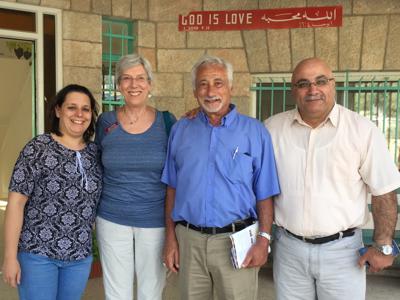
Bethlehem and West Bank area, and cannot pay school fees or supply even the most basic of school equipment for themselves. But, unlike many private schools in the Holy Land, our school never turns away a needy child on financial grounds. We welcome them, we distribute food at cost who would otherwise go hungry, and we provide a home for children who have been orphaned or who have no stable family environment.
However, the cost to us of this policy of caring for the most vulnerable children is very great. Because the school receives no government grants and very little is paid to us in school fees, Hope School relies for its income on gifts and donations from organizations and individual supporters around the world.
Your prayers are very much needed for Hope School and for the vulnerable children in our care who are looking ahead for an auspicious future.
Hope School General Director: Khader Saba
Development Director Laila Nour
HOPE SECONDARY SCHOOL – P.O. Box 19208, Jerusalem, Israel, Email: info@hopeschoolpal.com
Since 2014, Pilgrims of Ibillin has been a sponsor of the Maia Water Project, supporting MECA’s work for Children in the Middle East. You can support it by designating the Maia Project for your online gift.
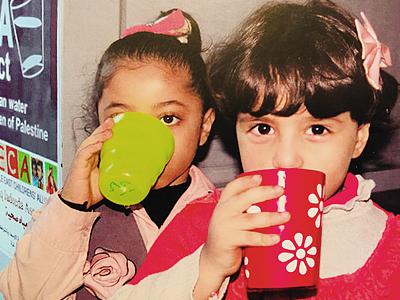 There is a growing water crisis in Palestine. In Gaza, 95% of water is unfit for human consumption. Numerous military attacks on the Gaza Strip have devastated Gaza’s water infrastructure and the ten-year siege of Gaza has created a shortage of pipes, building materials, fuel and electricity. The water in Gaza is polluted with untreated sewage, agricultural chemicals, and it is brackish from seawater. Gaza’s water crisis poses grave health risks to children.
There is a growing water crisis in Palestine. In Gaza, 95% of water is unfit for human consumption. Numerous military attacks on the Gaza Strip have devastated Gaza’s water infrastructure and the ten-year siege of Gaza has created a shortage of pipes, building materials, fuel and electricity. The water in Gaza is polluted with untreated sewage, agricultural chemicals, and it is brackish from seawater. Gaza’s water crisis poses grave health risks to children.
In September 2009, the Middle East Children’s Alliance (MECA) launched the Maia Project (Arabic for “water”) to provide Palestinian children with clean, safe drinking water. The Maia Project provides safe clean, drinking water for tens of thousands of Palestinian children by installing water purification and desalination units in schools throughout the Gaza Strip.
This project began when the Student Parliament at the UN Boys’ School in Bureij Refugee Camp, Gaza were given the opportunity to choose one thing they most wanted for their school: They chose to have clean drinking water. MECA’s partner in Gaza heard about this vote and, after meeting with representatives from the school and the Student Parliament, came to MECA to see if we could respond to the children’s request for drinking water. MECA provided the funds to build a water purification and desalination unit for the school in 2007.
In January 2008, the Middle East Children’s Alliance (MECA) and our Gaza partner, Afaq Jadeeda Association, completed the first Maia Project installation at the UN Bureij Boys’ School in Gaza. With funding from the Alalusi Foundation, we purchased and installed a water purification and desalination unit and renovated the outdoor drinking fountains and faucets at the school.
Since the formal launching of the Maia Project in September 2009, MECA and Afaq Jadeeda have installed units at additional UN schools and kindergartens throughout the Gaza Strip. Thanks to the generosity of MECA supporters and groups around the country who are organizing for the Maia Project, 68,000 children in Gaza now have access to clean drinking water! The UN schools are overcrowded and students come in shifts so each unit provides clean drinking water to all of these children.
For more information, check out the MECA page for the Maia Project: Click here.
View the video recording of the Seraj Webinar:
Q1. How did you use the grant your group received from Pilgrims of Ibillin in 2016? Are there any stories you could share about how that gift helped?
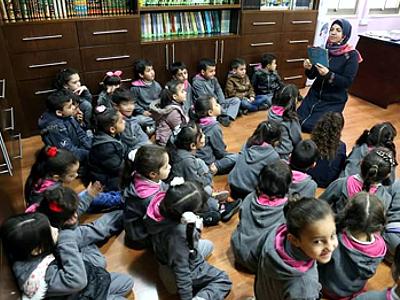 Seraj Library Project had an amazing 2016. We are growing our capacity by leaps and bounds. At the beginning of the year, we started a scholarship program, funded by friends in the US, for university students in the villages and camps where we work. The students on the scholarship must maintain a good GPA and volunteer a minimum of ten hours a week at their local Seraj library. This new group of volunteers has been incredibly active and has brought new energy into our libraries.
Seraj Library Project had an amazing 2016. We are growing our capacity by leaps and bounds. At the beginning of the year, we started a scholarship program, funded by friends in the US, for university students in the villages and camps where we work. The students on the scholarship must maintain a good GPA and volunteer a minimum of ten hours a week at their local Seraj library. This new group of volunteers has been incredibly active and has brought new energy into our libraries.
The gift from Pilgrims of Ibillin was used to fund many activities at each of our libraries. The first was “Layali Ramadaniyeh”, or “Ramadan Nights”, which was a cultural evening at six of our libraries after the Iftar, or the breaking of the fast during Ramadan. We partnered with the Goethe Institut to bring together the people of the communities with their own musicians, story-tellers, poets and dancers. This is a tradition from long ago but has since been forgotten. The communities responded very positively to this and are hoping we can do it again this year.
We also held an activity to celebrate the olive harvest, which was called “Stories under the olive trees.” Each of the volunteers in the libraries took children to a local home to help pick olives. In the refugee camps, where they do not have land, we provided the community with olive trees to plant in planters made of tires. This was followed by a breakfast and local story tellers and community leaders reading stories to the children. We also hope to do this event again next year.
And finally, with the generous support of Pilgrims if Ibillin, we held two winter camps, one in Deir Ammar refugee camp for junior high aged children and one in the village of Kufor Ni’ameh for elementary school aged children. The activities included arts and crafts, storytelling, hiking, team building exercises, and sports. These activities are in addition to our regular library activities, which include tutoring, trainings, community meetings, arts and crafts, storytelling, drama and reading games. We are thankful to have partnered with Pilgrims of Ibillin to bring these activities to rural Palestinian communities and refugee camps.
Q2. What will our 2017 grant enable you to do? Who will be served, and what difference will it make for them?
We would like to continue the same activities we have started with your support and build on them. We would like to conduct a training for our volunteers on puppeteering, and old art in Palestine that is nearly forgotten. Not only would the library volunteers learn to make the puppets and perform with them, they would learn to create a special theater for them, called a “surprise theater”, that is unique to Palestine. The volunteers would then be able to work with the children in their communities, where dramatic play is needed.
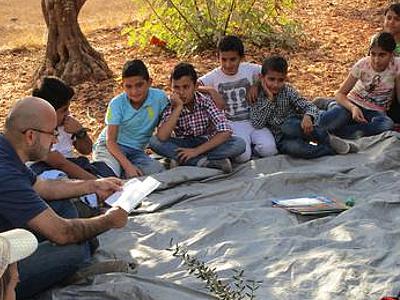
We would also like to grow our spring Children’s Festival, which focuses on ages 3-5. This was the first festival in Palestine to focus on this early age group and it was very successful. We would like to see it grow next year.
Q3. What else is happening for you this year? Anything we can help you celebrate, or concerns you would like us to know about? New projects in development? New challenges developing as you face the many obstacles you have to deal with?
We will officially open our 8th library in the Jordan Valley community of Jiftlek this spring (though we have been conducting activities at the site for the past year). This is a very impoverished community who suffer from the severe restrictions of the occupation on a daily basis, including no access to their land, the inability to build homes or schools and no water. This library is truly a beautiful and safe space for the children to come and dream of a better world.
Q4. If you have a current newsletter, a recent report on your activities, or any photos of people or activities, please share those.
All of our newsletters can be found on our website, www.serajlibraries.org, and included here are a few pictures from our activities. We also produced a short video on our work which can be seen below:
Donate to Support the Seraj Library Project
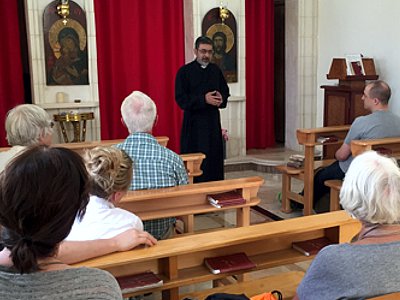
Fr. Firas Khoury Diab, the priest at St. George’s Melkite Catholic Church in Zababdeh, sees his church as a catalyst for change and growth in this upper West Bank village. Caring for the spiritual needs of the Melkites and their neighbors in Zababdeh is a top priority. But Abuna Firas believes his work beyond leading the prayers and liturgies is also a high calling.
Abuna Firas works with local people to keep family-supporting jobs in this area, despite the limits on commerce resulting from checkpoints and travel/trade limitations. Pilgrims of Ibillin’s first Peace gift to Zababdeh was for the purchase of new industrial sewing machines, followed by an embroidery machine. Subsequent gifts have provided a scroll saw for olive wood craftmaking, gave seed-money for materials to a women’s hand-embroidery collective, and helped build an addition onto the church — now used to house the after-school tutoring program which serves local children and youth.
We count on special donations from friends of Fr. Firas and Zababdeh to make these gifts possible.
These funds are going for 2 purposes: Part of our gift will provide for an after-school tutoring and enrichment program for local children to strengthen their math, reading, and language skills and to provide extra activities in music, dance, and drama. A second and larger part of our gift will provide scholarships for local students from 2nd grade through high school as they attend the excellent private Catholic school in Zababdeh.
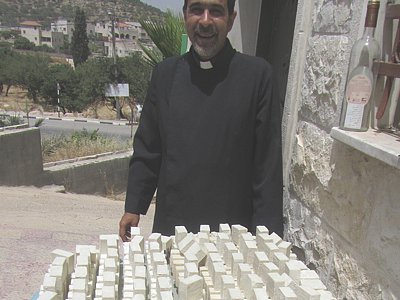
Soap Project Description
Finally, members of the Zababdeh Church make pure olive oil soap using traditional methods, and most of this soap will be sent to American (or other international) friends who offer the soap for sale during Alternative Christmas markets and sales. The profits of the soap sales pay fair trade wages to the olive farmers, the soap maker and packager, and even the taxi driver who delivers the soap to be shipped abroad. Part of the profits also help provide the kindergarten program for local low-income children.
For a PDF describing the program , click here.